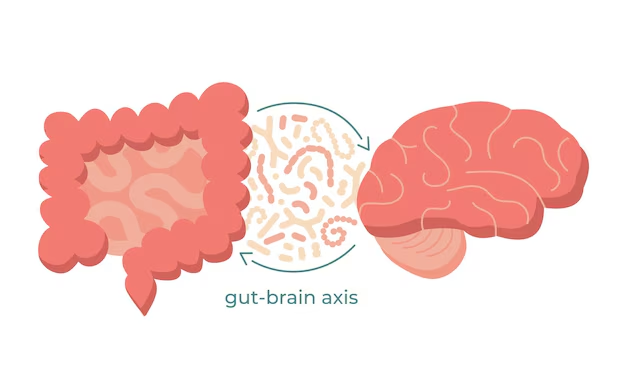In recent years, gut health has become a key focus in the world of health and wellness. Scientists and health experts now understand that the gut is more than just a place for digestion. It is home to trillions of tiny organisms, including bacteria, viruses, and fungi, which all work together in a complex system known as the microbiome.
This microbiome plays a big role in many important body functions. It helps break down food, supports the immune system, and even influences mood and brain health. A healthy gut can improve digestion, reduce inflammation, and boost energy levels.
Keeping the gut balanced and thriving is essential for overall wellness. When the gut microbiome is healthy, it supports the body in many ways. But when it’s unbalanced, it can lead to health issues like poor digestion, low immunity, or even mental health concerns. That’s why taking care of gut health is so important.
This article will explore the multifaceted nature of gut health, providing a detailed, effective, and attractive overview of how the gut works, why it’s important, how to maintain a healthy gut, and the impact of poor gut health on our physical and mental states.

Understanding the Gut and Its Microbiome
The gut, or gastrointestinal (GI) tract, is a complex system that stretches from the mouth to the rectum. It plays a vital role in breaking down food, absorbing nutrients, and eliminating waste from the body.
Beyond these basic functions, the gut is home to a large and diverse group of microorganisms. These include bacteria, viruses, fungi, and even parasites. Together, they form what is known as the gut microbiome. This microbiome supports digestion, strengthens the immune system, and helps maintain overall health and balance throughout the body.
What is the Microbiome ?
The microbiome refers to the community of microorganisms that live throughout the human body, with the gut containing the largest and most active population. These microbes include bacteria, viruses, fungi, and other microscopic organisms that play a vital role in maintaining overall health. The gut alone is home to an estimated 100 trillion microbial cells, which is more than the total number of human cells in the entire body.
This massive and diverse microbial environment is not static; it changes based on diet, lifestyle, age, and environmental factors. The gut microbiome contains both helpful (probiotic) and harmful (pathogenic) microbes. Probiotic organisms help with digestion, nutrient absorption, immune response, and protecting against infections. On the other hand, harmful microbes can lead to health problems when they grow out of control.
A healthy gut depends on the right balance between these good and bad microbes. When the microbiome is in harmony, it supports digestion, boosts immunity, and contributes to better physical and mental health.
How the Microbiome Influences Gut Health
The microbiome influences gut health by helping break down complex carbohydrates, synthesizing essential vitamins (like B and K), regulating immune responses, protecting against harmful pathogens, and maintaining the integrity of the gut lining. A healthy, balanced microbiome also ensures the proper movement of food through the digestive system and promotes overall digestive comfort.
The Gut-Brain Axis: A Two-Way Street
You might have heard the term “gut-brain axis.” This refers to the bidirectional communication between the gut and the brain, which has significant implications for both physical and mental health.

The Role of the Vagus Nerve
The vagus nerve is one of the longest and most important nerves in the body, acting as a key communication highway between the gut and the brain. It plays a crucial role in the gut-brain axis, a complex system that allows signals to travel back and forth between the digestive system and the central nervous system. This means that the gut is not only influenced by the brain but also sends important information to it.
Recent research has found that gut microbes can create chemical substances that directly influence brain function. One of the most well-known of these substances is serotonin, a neurotransmitter involved in regulating mood, sleep, and emotions. Surprisingly, about 90% of the body’s serotonin is produced in the gut rather than the brain. This discovery highlights just how closely our mental well-being is tied to gut health. Scientists now believe that maintaining a healthy gut may help improve mood, focus, and even memory.
Gut Health and Mental Health
Over the past few years, more and more studies have found strong connections between gut health and mental health. Many common mental health conditions—such as anxiety, depression, and even developmental disorders like autism—have been linked to changes in the gut microbiome. When the gut’s microbial balance is disturbed, a condition called dysbiosis can occur. This imbalance can disrupt the gut-brain connection, leading to changes in brain function and behavior.
Dysbiosis can cause inflammation, reduce the production of beneficial chemicals, and increase the presence of harmful bacteria—all of which can affect mood and cognitive performance. Some people with depression or anxiety have reported feeling better after taking steps to restore gut health, such as eating a balanced diet, taking probiotics, or reducing stress. These findings suggest that mental health treatment may benefit from a stronger focus on improving gut health alongside traditional approaches.
Factors That Influence Gut Health
Maintaining a healthy gut requires a balance of multiple factors. The following are some of the most important factors that can influence the health of your gut:
Diet and Nutrition
The food we consume plays a powerful role in shaping our gut microbiome. Every meal we eat influences the types of bacteria that grow in our digestive system. A diet rich in whole, natural foods such as fruits, vegetables, whole grains, and fermented products supports the growth of beneficial bacteria that protect our health. In contrast, eating a lot of processed foods, added sugars, and unhealthy fats encourages the growth of harmful bacteria. Over time, this imbalance can lead to digestive issues, inflammation, and even weakened immunity.
Prebiotics
Prebiotics are a type of dietary fiber that our bodies can’t digest, but our gut bacteria can. Found in foods such as garlic, onions, leeks, asparagus, bananas, and oats, prebiotics serve as food for the good bacteria in our gut. By consuming more prebiotic-rich foods, we help these helpful microbes grow stronger and more active, which leads to better digestion and improved immune defense.

Probiotics
Probiotics are live bacteria that we can take in through certain foods or supplements. These friendly bacteria help restore and maintain a healthy balance in the gut. Foods like yogurt, kefir, sauerkraut, kimchi, and miso are natural sources of probiotics. When consumed regularly, probiotics can support digestion, reduce bloating, and improve nutrient absorption. They are especially useful after a course of antibiotics or during periods of digestive discomfort.
Fiber
Fiber is essential for good gut health. It feeds the beneficial bacteria, supports regular bowel movements, and helps prevent constipation. A fiber-rich diet made up of fruits, vegetables, legumes, and whole grains keeps the gut working smoothly. Soluble fiber can also help regulate blood sugar and cholesterol levels, while insoluble fiber adds bulk to the stool and aids in waste elimination. Together, they contribute to a healthy and well-functioning digestive system.
Antibiotics and Medications
While antibiotics are effective at fighting infections, they don’t distinguish between harmful and helpful bacteria. This means they can wipe out large portions of the gut microbiome, often leading to digestive imbalances like diarrhea or yeast overgrowth. Other medications, such as painkillers, antacids, and antidepressants, can also alter gut bacteria or irritate the gut lining. After using these drugs, it’s important to focus on rebuilding a healthy microbiome through proper nutrition and possibly probiotic support.
Stress
Stress has a deep impact on gut health. When you’re under constant stress, the body releases hormones like cortisol, which can slow down digestion, change gut motility, and increase sensitivity in the digestive tract. Stress also affects the balance of microbes, often allowing harmful bacteria to grow. Over time, this can lead to issues like leaky gut syndrome, inflammation, and mood changes. Managing stress through breathing exercises, meditation, or therapy can help restore gut balance.
Sleep
Sleep and gut health are closely connected. Poor sleep quality or irregular sleep patterns can disrupt the gut microbiome and lead to imbalances. At the same time, an unhealthy gut can interfere with sleep by affecting hormone levels and nervous system function. This creates a cycle where poor sleep weakens gut health and poor gut health worsens sleep. Sticking to a consistent bedtime and getting 7 to 9 hours of sleep each night helps promote microbial balance and better overall health.
Exercise
Regular physical activity benefits not just your muscles and heart but also your gut. Exercise increases blood flow to the digestive organs and improves gut motility, which helps food move efficiently through the intestines. It also supports the growth of beneficial bacteria, reducing inflammation and supporting immune health. A balanced fitness routine that includes both aerobic exercises like walking or cycling and strength training can lead to a more diverse and resilient gut microbiome.
Signs of an Unhealthy Gut
A healthy gut is the foundation for optimal health, so it’s important to recognize the signs of an unhealthy gut before it leads to more serious health issues. Some common signs of gut imbalance include:
Digestive Issues

Bloating: Bloating is a common symptom that causes a feeling of fullness, tightness, or swelling in the stomach area. It can occur after eating and may be accompanied by gas or discomfort. This often results from poor digestion or an imbalance in gut bacteria, both of which are key indicators of poor gut health.
Constipation or Diarrhea: Frequent constipation or ongoing diarrhea can signal a problem with gut health. These irregular bowel movements may be linked to dysbiosis, which is an imbalance in the gut microbiome, or other digestive issues that affect how the body processes waste.
Heartburn and Acid Reflux: Heartburn and acid reflux often occur when stomach acid flows back into the esophagus, causing a burning sensation. These issues can be signs of poor gut health, especially if they happen frequently. They may also point to problems with stomach acid levels or digestion.
Cravings: Strong and uncontrollable cravings for sugar, refined carbs, or processed foods can be a sign of poor gut health. When the gut microbiome is out of balance, harmful bacteria may influence cravings and push the body to seek foods that help them thrive, rather than what’s truly healthy.
Skin Conditions
There is a strong link between gut health and the condition of your skin. When gut health is poor, it can lead to skin problems such as acne, eczema, or psoriasis. This happens because the gut plays a key role in removing toxins from the body and controlling inflammation. If the gut is imbalanced, toxins may build up, and inflammation can increase, both of which may show up on the skin as irritation or breakouts.
Fatigue and Poor Sleep
Gut health has a direct influence on how well you sleep and how energized you feel. A healthy gut produces neurotransmitters like serotonin, which helps regulate mood and sleep patterns. When the gut is out of balance, it can disrupt serotonin production, leading to trouble falling asleep, poor sleep quality, or feeling tired even after resting. Improving gut health may help restore better sleep and reduce daily fatigue.
Frequent Infections or Illnesses
A large part of the body’s immune system—about 70%—is located in the gut. This means gut health plays a major role in protecting the body against illness. When the gut microbiome is unbalanced, the immune system can weaken, making it easier for harmful bacteria and viruses to cause infections. Maintaining a healthy gut is essential for strong immune defenses.
Mental Health Issues
Poor gut health can negatively affect brain function and emotional well-being. Since the gut and brain are closely connected through the gut-brain axis, imbalances in gut bacteria can lead to mood disorders such as anxiety, depression, and chronic stress. If you are experiencing ongoing emotional challenges, it may be worth exploring whether your gut health is a contributing factor.
How to Restore and Maintain a Healthy Gut
The good news is that it’s possible to restore and maintain gut health with a few simple lifestyle changes. Here are some evidence-based strategies for promoting a thriving gut microbiome:
Eat a Diverse Diet
One of the most effective ways to support gut health is by eating a wide variety of foods, especially plant-based options. A diverse diet encourages a rich and balanced gut microbiome by providing different types of nutrients and fibers. Including a mix of fruits, vegetables, whole grains, legumes, nuts, and seeds ensures that beneficial gut bacteria receive the nourishment they need to grow and function well.
Include Fermented Foods
Fermented foods are excellent for promoting gut health because they are natural sources of probiotics—live bacteria that contribute to a healthy gut environment. Regularly consuming foods like kefir, yogurt, kimchi, sauerkraut, kombucha, miso, and tempeh can help increase the population of good bacteria in the digestive system and improve overall digestion and immunity.

Reduce Processed Foods and Sugar
Limiting the intake of processed foods, added sugars, and unhealthy fats is crucial for maintaining gut health. These types of foods can disrupt the balance of the gut microbiome by feeding harmful bacteria and increasing inflammation. Choosing natural, whole foods over processed options can help restore and protect the integrity of the gut lining.
Stay Hydrated
Proper hydration plays a vital role in supporting a healthy digestive system. Drinking enough water throughout the day helps regulate bowel movements and maintain the mucosal lining of the intestines, which acts as a protective barrier against harmful microbes. Staying hydrated also aids in the smooth transport of nutrients and waste through the digestive tract, further supporting gut health.
Manage Stress
Chronic stress can negatively impact gut health by altering the composition of gut bacteria and weakening the gut-brain connection. Practicing relaxation techniques like meditation, yoga, deep breathing, or spending time in nature can help lower stress levels. Reducing stress not only benefits mental health but also helps preserve the balance and stability of the gut microbiome.
Get Enough Sleep
Getting quality sleep each night is essential for good gut health. Poor sleep patterns can disrupt the body’s natural rhythms and affect the balance of gut bacteria. Establishing a relaxing bedtime routine, avoiding screens before bed, and maintaining a regular sleep schedule can improve both sleep quality and digestive health, creating a positive cycle of wellness.
Regular Exercise
Engaging in regular physical activity supports healthy gut function by stimulating gut motility, enhancing blood flow to the digestive organs, and encouraging the growth of beneficial bacteria. Both aerobic exercises like walking, running, or swimming and strength training contribute to improved gut health and better overall physical and mental well-being.
Consider Probiotics and Prebiotics
Supplementing your diet with probiotics can be a helpful way to restore gut health, especially after illness or antibiotic use. High-quality probiotic supplements introduce beneficial bacteria directly into the digestive tract. At the same time, consuming prebiotic-rich foods such as garlic, onions, bananas, and oats provides nourishment for these good bacteria, helping them to thrive and maintain a balanced microbiome.
Conclusion: The Vital Role of Gut Health in Overall Well-Being

In conclusion, gut health is a cornerstone of overall well-being, impacting everything from digestion and immunity to mental health and mood regulation. The gut microbiome, a complex ecosystem of trillions of microorganisms, plays a pivotal role in maintaining a balanced and thriving body.
By understanding the key factors that influence gut health—such as diet, stress, sleep, and exercise—we can take actionable steps to support and restore balance in our gut. Prioritizing a diverse, fiber-rich diet, consuming fermented foods, managing stress, staying hydrated, and getting adequate sleep are all essential strategies for fostering a healthy gut.
As science continues to uncover the intricate connections between the gut and the brain, the importance of maintaining gut health becomes ever more clear. By investing in the health of our gut, we can enhance our overall vitality, improve our quality of life, and protect ourselves from a variety of chronic conditions.
FAQs
- What is gut health and why is it important ?
Gut health refers to the balance and function of the digestive system, especially the microorganisms living in the intestines. A healthy gut supports digestion, nutrient absorption, immune function, and even mental well-being. - How can I tell if my gut health is poor ?
Common signs of poor gut health include bloating, constipation, diarrhea, frequent infections, fatigue, and mood changes like anxiety or depression. - What foods improve gut health ?
Foods rich in fiber, prebiotics (like garlic and bananas), and probiotics (like yogurt and kimchi) help support gut health by feeding good bacteria and maintaining balance. - Can stress really affect my gut ?
Yes. Chronic stress can disrupt gut bacteria and slow digestion, leading to issues like bloating, indigestion, or even inflammation in the gut lining. - Should I take probiotic supplements daily ?
Probiotic supplements can be helpful, especially after illness or antibiotics, but it’s best to consult a healthcare provider to find the right type and dosage.
